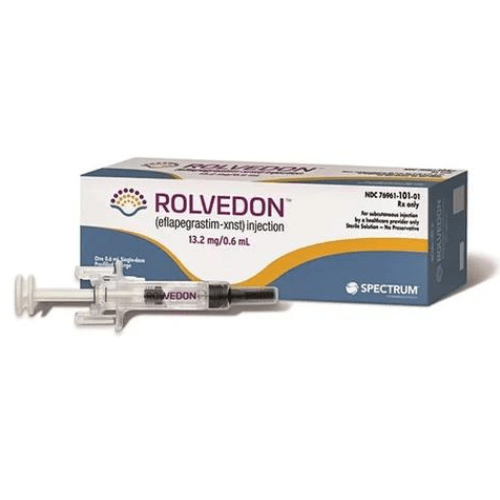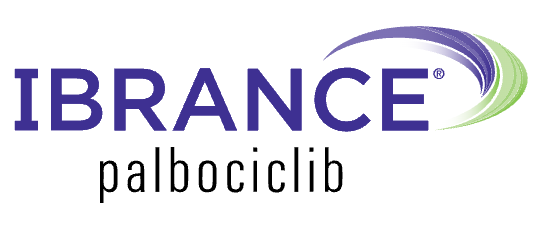
Introduction
Rolvedon (eflapegrastim-xnst) is a prescription medication used to reduce the risk of infection in patients undergoing certain types of chemotherapy that can cause a low white blood cell count (neutropenia). This blog will provide a comprehensive overview of Rolvedon, covering its indications, mechanism of action, warnings, precautions, contraindications, drug interactions, side effects, and conclusion.
FDA Approval and Manufacturer
Rolvedon was approved by the U.S. Food and Drug Administration (FDA) on September 9th 2022. It is manufactured by Spectrum Pharmaceuticals, Inc.
Indications
Rolvedon is a medication classified as a leukocyte growth factor. It is prescribed to reduce the likelihood of infection, particularly febrile neutropenia, in adult patients with non-myeloid malignancies who are undergoing treatment with myelosuppressive anti-cancer drugs known for a clinically significant incidence of febrile neutropenia.
Mechanism of Action
Rolvedon, a recombinant human granulocyte growth factor, binds to G-CSF receptors on myeloid cells and neutrophils, triggering signaling pathways that control cell functions. This mechanism supports the production and function of white blood cells, reducing the risk of infection, especially febrile neutropenia, in adult patients with non-myeloid malignancies undergoing myelosuppressive anti-cancer treatments.
Dosage And Administration
- Rolvedon is administered via subcutaneous injection by a healthcare professional. If your healthcare provider deems it appropriate, you or your caregiver may administer the injections at home.
- In such cases, carefully follow the provided “Instructions for Use” that accompanies your Rolvedon for guidance on preparing and administering the dose. Both you and your caregiver will be trained on the proper procedure before self-administration.
- Each chemotherapy cycle involves one injection of Rolvedon, typically given around 24 hours after completing the chemotherapy session. Ensure you have the necessary information and understanding before proceeding with the injections.
Warnings and Precautions
- Hypersensitivity Reactions: Rolvedon may cause serious allergic reactions, including anaphylaxis. Stop taking Rolvedon and seek immediate medical attention if you experience symptoms like hives, swelling, difficulty breathing, or dizziness.
- Spleen Rupture: Rolvedon may increase the risk of spleen rupture, especially in patients with an enlarged spleen or certain medical conditions.
- Acute Respiratory Distress Syndrome (ARDS): Assess patients developing fever, lung infiltrates, or respiratory distress. Discontinue Rolvedon in ARDS cases. Rolvedon may decrease lung function in patients with pre-existing lung conditions.
- Sickle Cell Crisis: Discontinue Rolvedon if sickle cell crisis occurs in patients with Sickle Cell Disorders.
- Glomerulonephritis: Evaluate and consider dose reduction or interruption if causality is likely.
- Leukocytosis: Monitor complete blood count (CBC) during Rolvedon therapy.
- Thrombocytopenia: Monitor platelet counts.
- Myelodysplastic Syndrome (MDS) and Acute Myeloid Leukemia (AML): There have been rare reports of leukemia and myelodysplastic syndrome (MDS) in patients taking G-CSFs, including Rolvedon. The long-term risk of these cancers is unknown. Monitor patients with breast and lung cancer using Rolvedon with chemotherapy and/or radiotherapy for signs and symptoms of MDS/AML.
- Bone Pain: Rolvedon can cause bone pain. This pain is usually mild to moderate and goes away on its own after a few days. However, if the pain is severe or persistent, contact your doctor.
Contraindications
Rolvedon is contraindicated in patients with:
- A known hypersensitivity to eflapegrastim-xnst or any of the other ingredients in the medication.
- Active infection.
- Sickle cell anemia.
Pregnancy And Breastfeeding
There is insufficient information regarding the presence of eflapegrastim-xnst in human milk and its impact on breastfed infants or milk production. Similarly, for Rolvedon use in pregnant women, no specific data are available. However, studies on other recombinant human granulocyte colony-stimulating factor (rhG-CSF) products used during pregnancy have not shown any significant risks of major birth defects, miscarriage, or adverse outcomes for both the mother and the fetus.
Pediatric And Geriatric Patients
Rolvedon’s safety and effectiveness have not been established in pediatric patients. In clinical studies involving 314 patients, individuals aged 65 and over constituted 39%, with 6% being 75 and over. No significant differences in safety or effectiveness were observed between these older subjects and their younger counterparts.
Drug Interactions
Inform your healthcare provider about your complete medication regimen, encompassing both prescribed and over-the-counter drugs, vitamins, and herbal supplements. Disclose all medications and supplements you are currently using before initiating Rolvedon treatment.
Side Effects
Common side effects of Rolvedon include:
- Fatigue
- Nausea
- Diarrhea
- Bone pain
- Headache
- Fever
- Anemia
- Rash
- Muscle and joint pain
- Back pain
Less common side effects include:
- Decreased appetite
- Feeling of warmth
- Redness of the face, neck, arms, and upper chest
- Injection site reactions
- Dizziness
- Constipation
- Cough
- Abdominal pain
- Vomiting
- Swollen lymph nodes
- Sleep problems
- Anxiety
- Depression
- Bleeding or bruising easily
- Abnormal liver function tests
Conclusion
Rolvedon is a valuable medication for reducing the risk of infection in patients undergoing chemotherapy that can cause neutropenia. However, it is important to be aware of the potential warnings, precautions, contraindications, drug interactions, and side effects before starting treatment. It is crucial to discuss all concerns with your doctor to ensure Rolvedon is the right treatment for you.
FAQ
What is Relvedon?
Rolvedon is a synthetic, extended-release version of granulocyte colony-stimulating factor (G-CSF). G-CSF is a natural substance generated by the body to promote the development of neutrophils, a crucial type of white blood cell essential for the body’s defense against infections. Rolvedon belongs to the family called colony-stimulating factors.
What should I inform the physician before starting Relvedon treatment?
Before starting Rolvedon, inform your healthcare provider about your medical history, disclosing any conditions such as sickle cell disorder or kidney problems. Notify them if you are pregnant, planning pregnancy, breastfeeding, or intending to breastfeed, as the impact of Rolvedon on unborn babies and breastfeeding infants is uncertain. Additionally, provide a comprehensive list of all medications, including prescription and over-the-counter drugs, vitamins, and herbal supplements, that you are currently taking.
What is the price of Rolvedon in India?
To inquire about the Rolvedon price in India and to understand the importation process, you can contact their dedicated Patient Support Team at (+91) 93157 05373 or via email at help@sansfro.com. They’ll provide the necessary information to facilitate a smooth and transparent process for obtaining Rolvedon.
How to buy Rolvedon online?
If you’re seeking to buy Rolvedon online and need assistance navigating the importation process, Sansfro Health, a specialized pharmaceutical procurement company, is here to help. They offer transparent pricing and are committed to streamlining the medication importation journey. Enquire about the medicine by contacting at (+91) 9315705373 or via email at help@sansfro.com.
Reference



